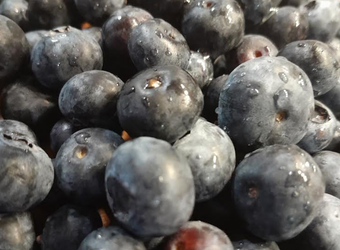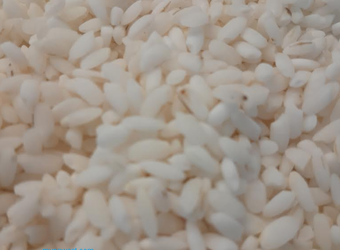Blueberries are loaded with antioxidants, particularly flavonoids such as anthocyanins
Blueberries are often considered a superfood due to their impressive nutrient profile and numerous health benefits. Here are some of the key benefits of consuming blueberries:
1. **Rich in Antioxidants**: Blueberries are loaded with antioxidants, particularly flavonoids such as anthocyanins, which give them their characteristic deep blue color. These antioxidants help protect cells from damage caused by harmful free radicals and may reduce the risk of chronic diseases like heart disease, cancer, and neurodegenerative conditions.
2. **Heart Health**: Regular consumption of blueberries has been associated with improvements in heart health. The antioxidants in blueberries may help lower blood pressure, reduce LDL (bad) cholesterol levels, and improve overall cardiovascular function, thus reducing the risk of heart disease and stroke.
3. **Brain Health**: Blueberries are often touted for their potential cognitive benefits. Studies suggest that the antioxidants and other compounds in blueberries may help improve memory, enhance cognitive function, and protect against age-related cognitive decline and neurodegenerative diseases such as Alzheimer's disease.
4. **Anti-Inflammatory Properties**: The antioxidants and phytochemicals found in blueberries have anti-inflammatory properties, which can help reduce inflammation throughout the body. Chronic inflammation is linked to various health conditions, including heart disease, diabetes, and arthritis, so consuming blueberries may help mitigate inflammation and its associated risks.
5. **Digestive Health**: Blueberries are a good source of dietary fiber, which is essential for digestive health. Fiber promotes regular bowel movements, prevents constipation, and supports a healthy gut microbiome by feeding beneficial gut bacteria. This can improve overall digestive function and reduce the risk of gastrointestinal disorders.
6. **Eye Health**: The antioxidants in blueberries, particularly anthocyanins, may benefit eye health by protecting against age-related macular degeneration (AMD) and cataracts. Including blueberries in your diet may help maintain vision and reduce the risk of eye-related disorders as you age.
7. **Blood Sugar Control**: Despite their natural sweetness, blueberries have a relatively low glycemic index, meaning they cause a slower and more gradual increase in blood sugar levels compared to high-glycemic foods. This can help stabilize blood sugar levels and improve insulin sensitivity, making blueberries a suitable fruit choice for individuals with diabetes or those aiming to manage blood sugar levels.
8. **Weight Management**: Blueberries are low in calories but high in fiber, which can help promote feelings of fullness and satiety. Incorporating blueberries into your diet as a snack or adding them to meals may aid in weight management by reducing overall calorie intake and controlling appetite.
Overall, blueberries are a delicious and nutritious addition to any diet, offering a wide range of health benefits that support overall well-being. Incorporating them into your meals, snacks, smoothies, or desserts can provide a flavorful way to boost your nutrient intake and support your health goals.
Blueberries can be a beneficial addition to the diet of pregnant women, offering a range of essential nutrients that support both maternal health and fetal development. Here are some reasons why blueberries can be particularly beneficial during pregnancy:
1. **Rich in Antioxidants**: Blueberries are packed with antioxidants, including vitamin C and various phytochemicals such as anthocyanins. These antioxidants help protect cells from damage caused by harmful free radicals, supporting overall health and reducing the risk of chronic diseases.
2. **Folate Content**: Folate, or folic acid, is a crucial nutrient during pregnancy as it helps prevent neural tube defects and supports proper fetal development, particularly in the early stages of pregnancy. Blueberries contain folate, making them a valuable addition to the diet of pregnant women.
3. **Vitamin C**: Blueberries are an excellent source of vitamin C, which plays a vital role in collagen formation, immune function, and the absorption of iron. Pregnant women have increased vitamin C requirements, and consuming foods rich in this vitamin, such as blueberries, can support maternal health and fetal growth.
4. **Fiber**: Blueberries are a good source of dietary fiber, which can help prevent constipation, a common discomfort during pregnancy. Fiber also supports digestive health and may help regulate blood sugar levels, which can fluctuate during pregnancy.
5. **Hydration**: Blueberries have a high water content, contributing to hydration, which is essential during pregnancy. Staying hydrated helps support the body's functions, including circulation, digestion, and nutrient transport to the fetus.
6. **Low Calorie and Nutrient Dense**: Blueberries are relatively low in calories but rich in essential nutrients, making them a nutritious snack option for pregnant women. They provide vitamins, minerals, and antioxidants without contributing excess calories, which can be important for maintaining a healthy weight during pregnancy.
7. **Gut Health**: The fiber found in blueberries supports digestive health by promoting regular bowel movements and feeding beneficial gut bacteria. A healthy gut microbiome during pregnancy is associated with various maternal and fetal health benefits.
8. **Versatility**: Blueberries are versatile and can be easily incorporated into various dishes and snacks, such as smoothies, yogurt, oatmeal, salads, or simply eaten fresh as a snack. This makes it convenient for pregnant women to enjoy their nutritional benefits in a variety of ways.
Overall, blueberries can be a nutritious and delicious addition to the diet of pregnant women, providing essential nutrients, antioxidants, and hydration to support maternal health and fetal development. However, as with any food, it's essential to consume blueberries as part of a balanced diet and in moderation. If you have any concerns or specific dietary restrictions during pregnancy, it's always best to consult with a healthcare provider or a registered dietitian.






Related Articles